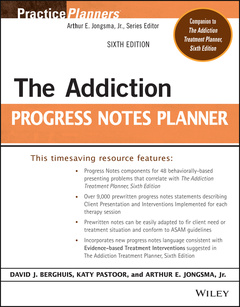Description
The Addiction Progress Notes Planner (6th Ed.)
PracticePlanners Series
Coordinators: Berghuis David J., Pastoor Katy, Jongsma Arthur E.
Language: English
Subject for The Addiction Progress Notes Planner:
688 p. · 20.8x26.4 cm · Paperback
Description
/li>Contents
/li>Biography
/li>
An invaluable practice resource for practitioners engaged in addictions treatment
In The Addiction Progress Notes Planner, Sixth Edition, a team of distinguished mental health professionals delivers complete, pre-written session and patient presentation descriptions for every behavioral problem in the Addictions Treatment Planner, Sixth Edition. Each note can be simply and quickly adapted to fit a real-world client need or treatment situation while remaining completely unified with the client?s treatment plan.
This new edition offers new and revised evidence-based objectives and interventions organized around 46 behavior-based presentations, including alcoholism, nicotine dependence, substance abuse, problem gambling, eating disorders, and sexual addictions. The resource also offers:
- A wide array of treatment approaches that correspond to the behavioral problems and DSM-V diagnostic categories included in the Addiction Treatment Planner, Sixth Edition
- Sample progress notes conforming to the requirements of most third-party payors and accrediting agencies, including CARF, TJC, COA, and the NCQA
- Brand-new chapters on Opioid Use Disorder, Panic/Agoraphobia, and Vocational Stress
The Addiction Progress Notes Planner is an indispensable practice aid for addictions counselors, mental health counselors, social workers, psychologists, psychiatrists, and anyone else treating clients suffering from addictions.
PracticePlanners Series Preface ix
Progress Notes Introduction 1
Adult-Child-of-an-Alcoholic (ACA) Traits 3
Anger 18
Antisocial Behavior 35
Anxiety 48
Attention-Deficit/Hyperactivity Disorder (ADHD)--Adolescent 63
Attention-Deficit/Hyperactivity Disorder (ADHD)--Adult 79
Bipolar Disorder 94
Borderline Traits 112
Childhood Trauma 127
Chronic Pain 141
Conduct Disorder/Delinquency 157
Dangerousness/Lethality 174
Dependent Traits 185
Depression--Unipolar 198
Eating Disorders and Obesity 215
Family Conflicts 231
Gambling 246
Grief/Loss Unresolved 260
Impulsivity 273
Legal Problems 285
Living Environment Deficiency 294
Medical Issues 305
Narcissistic Traits 321
Nicotine Abuse/Dependence 335
Obsessive Compulsive Disorder (OCD) 349
Occupational Problems 362
Opioid Use Disorder 379
Oppositional Defiant Behavior 395
Panic Disorder/Agoraphobia 412
Parent-Child Relational Problem 425
Partner Relational Conflicts 441
Peer Group Negativity 453
Posttraumatic Stress Disorder (PTSD) 463
Psychosis 480
Readiness to Change 495
Relapse Proneness 505
Self-Harm 519
Self-Care Deficits--Primary 535
Self-Care Deficits--Secondary 548
Sexual Abuse 561
Sexual Promiscuity 573
Sleep Disturbance 586
Social Anxiety/Skills Deficit 599
Spiritual Confusion 615
Substance-Induced
Disorders 625
Substance Intoxication/Withdrawal 634
Substance Use Disorders 644
Suicidal Ideation 661
DAVID J. BERGHUIS, MA, LLP, is President and Clinical Director for Berghuis Psychological Services, a leading provider of treatment for individuals with sexual behavior problems. He is President of the Michigan Chapter of the Association for Treatment of Sexual Abusers.
KATY PASTOOR is a Limited Licensed Psychologist at Berghuis Psychological Services, working with patients with demonstrated sexual behavior problems. Her work includes the completion of risk assessments, the running of treatment groups, and conducting individual therapy with clients.
ARTHUR E. JONGSMA, JR., PHD, is Series Editor for the bestselling Practice Planners. He has provided professional mental health services to both inpatient and outpatient clients for approximately 50 years. He was the Founder and Director of Psychological Consultants, a group private practice in Michigan for 25 years. He consulted to numerous addiction treatment facilities that provided outpatient, intensive outpatient, residential, and inpatient care.




